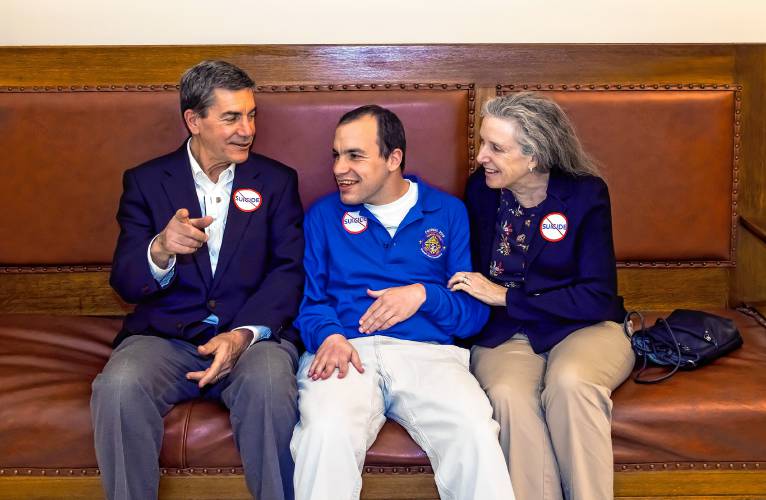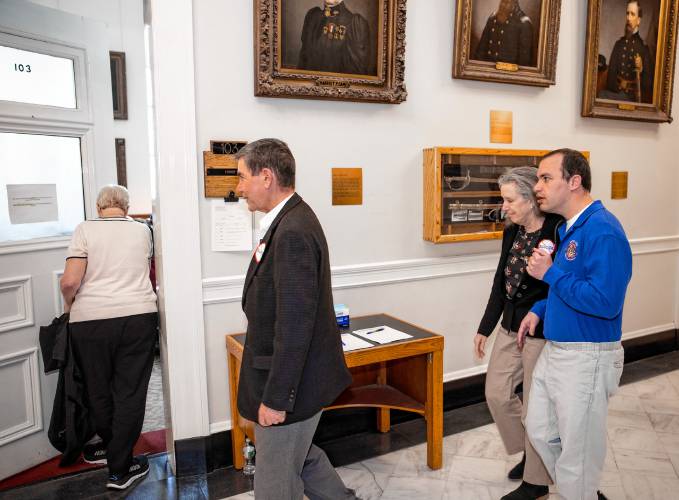New Hampshire residents weigh compassion and caution in medical aid in dying bill
| Published: 04-24-2024 3:56 PM |
Phillip Kaneb, sporting a vibrant blue shirt with a sticker boldly stating “no suicide,” strolled around the State House’s hallways on Wednesday, pausing intermittently to admire the paintings hanging on the walls, his infectious smile bringing joy to those who caught sight of him.
Accompanied by his parents, Stephen and Andrea, the family patiently awaited their turn outside the room, where they would have the opportunity to testify against House Bill 1283 which would allow people to end their life with medical assistance.
For them, this bill was not just a matter of legislation; it was deeply personal, intertwined with the life of their beloved son, Phillip, 33, who battles a rare form of epilepsy.
“Even before he was born, people were suggesting that I end his life,” Andrea Kaneb shared, her voice tinged with a mixture of sadness and determination.
Phillip’s premature birth at 27 weeks marked the beginning of a journey fraught with challenges, but also filled with profound love and resilience for the Exeter family.
They even had to advocate for Phillip’s education.
“Our system is not working well for people with developmental disabilities. Why should we trust you with their lives after we are gone?” Andrea Kaneb asked, her attention fixed on the testimonies streamed on her phone from outside the crowded room, a situation shared by many unable to secure seats “I can’t trust you. I’m sorry.”
House Bill 1283, also known as the end-of-life options bill, mirrors legislation in 10 other states and the District of Columbia, including nearby Maine and Vermont.
Article continues after...
Yesterday's Most Read Articles
If passed, New Hampshire’s bill would allow individuals aged 18 and above with terminal illnesses to opt for self-administered methods to end their lives. But for the Kanebs, this was not a choice they could support, not when their son’s life hung in the balance.
Eligibility for these medications would require verification from two healthcare providers, confirming the individual’s mental competence, prognosis of six months or less, voluntary decision-making and informed awareness of alternatives, among other criteria.
New Hampshire’s bill doesn’t impose residency restrictions like many other states, allowing anyone who meets the criteria to travel to the state and access medical aid in dying.
Currently, Vermont is the only state permitting non-residents, but the process is complex. Those seeking the medication must be present in Vermont at the time of ingestion, make arrangements for accommodations and have a hospice team in place.
Opponents of the bill often framed it as endorsing assisted suicide, a notion vehemently rejected by advocates like Patricia Wilczynski, a retired psychotherapist from Concord who witnessed her father’s battle with amyotrophic lateral sclerosis (ALS).
For her, it represents a compassionate option to end unbearable suffering, a way to grant dignity and autonomy to those facing the end of life.
“This disease was torture for him,” she expressed at the hearing, recounting her father’s struggle. “He couldn’t bear what was happening to him and how it was affecting my mom and the rest of us.”
While ALS affects muscle function, speech, and swallowing abilities, it leaves a person’s intellect and brain intact. Yet, for Wilczynski, witnessing her father lose motor skills was particularly devastating as he was deeply involved in activities requiring manual dexterity, such as building their home from the ground up, repairing a Jeep, and playing the saxophone.
Wilczynski’s father’s despair drove him to desperate measures. Once, he hurled himself down a flight of stairs, crashing onto the cement floor. Another time, he asked to be wheeled into the garage, have the car started and leave him near the exhaust.
“At that time his only option was to endure the daily torment brought on by this disease or try to kill himself in these inhumane and ultimately ineffective ways,” said Wilczynski, whose father choked to death.
Unlike other bills in the legislative session, the impact of the end-of-life options bill extended far beyond a select few, touching the lives of countless residents who grappled with questions of life, death, and human dignity.
It has passed the full House of Representatives and is now under review by the Senate Committee on Health and Human Services.
The fear of coercion looms large among those opposing the bill, particularly among individuals with disabilities or those with loved ones facing similar challenges.
Phillip, the second oldest in the Kaneb family, brings immense joy to them. Despite the hurdles they’ve encountered while raising him, Phillip’s presence fills their lives with happiness, said Stephen Kaneb.
His son’s ability to gauge emotions when he walks into the room and says something compassionate, free from any hint of offense always leaves Stephen Kaneb in awe.
“We have found him to be the biggest reason we’re here today,” Stephen Kaneb said as Phillip smiled broadly and rested his head gently on his dad’s shoulders. “But someone might say that he doesn’t contribute. But we’ve seen the opposite.”
Wheeling herself into the room to testify in support of the bill, Charmaine Manansala, chief advocacy officer at Compassion & Choices, explained that since Oregon passed the law in 1997, there hasn’t been any data supporting coercion of people with disabilities.
“You can take action today to prevent any more terminally ill New Hampshirites from suffering needlessly by voting yes on the bill,” Manansala urged the committee.“I would not do this work that I have done for 10 years if it put people with disabilities in harm’s way.”
But Melinda Simms, who lives a fulfilling life despite her spinal cord injury that has left her partially paralyzed from the neck down, worries about the bill exacerbating negative attitudes towards the disabled.
“I don’t want our state motto to be ‘If you can’t live free, then you should die,” said Rodney Simms, her husband expressing concern that the bill could lead to disabled people being seen as disposable.





 House passes bill to raise minimum marriage age to 18, sending it to governor
House passes bill to raise minimum marriage age to 18, sending it to governor Charities will not have to pay rent to casinos under new law
Charities will not have to pay rent to casinos under new law Sununu says he’ll support Trump even if he’s convicted
Sununu says he’ll support Trump even if he’s convicted NH mayors want more help from state on homelessness prevention funds
NH mayors want more help from state on homelessness prevention funds
